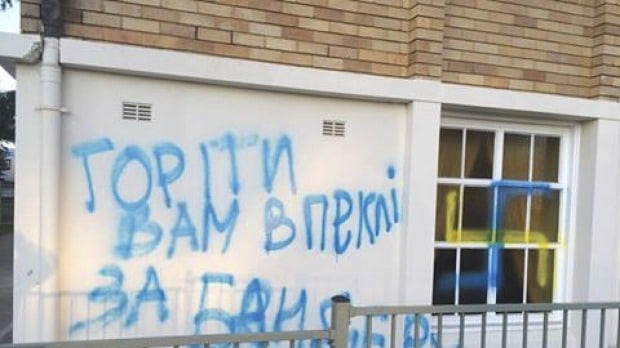
The Ukrainian Catholic parish whose church was desecrated with graffiti last weekend has been overwhelmed by offers of support as its priest urges parishioners to forgive the perpetrators.
Fr Simon Ckuj, parish priest of St Andrew’s Ukrainian Catholic Church in Lidcombe, said he “felt sick” when he discovered racial slurs and swastikas spray-painted on the church on Saturday morning.
The blue and yellow graffiti included messages that translated to ‘Burn in hell for the sins of Poroshenko’, the new Ukrainian president, and ‘Burn in hell for the sins of Bandera’, a Ukrainian nationalist leader who died in 1959.
The slogans appear to have been generated by the ongoing confrontation between Russia and Ukraine.
Those within the community and beyond have expressed their “outrage and indignation that something like this could happen”, Fr Simon told The Catholic Weekly.
He has been inundated by phone calls and messages,
with “everything from offers of financial help to cover any costs incurred, to people wanting to physically help remove it, to words of moral support”.
The priest called on parishioners at Sunday’s Masses to join him in praying for forgiveness and healing.
“They took to heart what I said at Mass yesterday,” he said.
“We’re about forgiveness, and there is nothing to fear.”
While parishioners were “upset, they’re quite shaken by it”; he has been impressed by the way they have drawn together.
Fr Simon had no shortage of volunteers to help remove the spray paint on Sunday.
“About 40 young people got together and, together with the help of a few politicians who turned up on the day, we cleaned it all off.”
Parts of the church’s exterior will need to be repainted, but Fr Simon was grateful the interior was not damaged.
The Ukrainian Catholic parish numbers more than 5000 in Sydney, and the community has “always been involved in things outside our own sphere”, he said.
Fr Simon, who was chaplain to a group of young Sydney Catholics at World Youth Day 2011 in Madrid, said: “Most of our people have assimilated quite well, still keeping their Ukrainian identity.”
He declined to comment on the graffiti in the context of proposed changes to Commonwealth racial discrimination law, but said he was “hopeful it is a one-off”. He added: “Life goes on, we have a job to do, we have the Gospel to preach, so we go ahead and do it.”
Earlier this month, Ukraine’s bishops asked for continued prayers for peace in their country.
“The dignity that Ukrainians yearn for is not first and foremost material,” said a message from the Permanent Synod of Bishops of the Ukrainian Catholic Church.
“They seek a God-given dignity, a respect for their very being. Their right for self-determination, territorial integrity, cultural and especially ecclesial tradition has been violated brutally in the past and is demeaned today.”
Referring to winter months of protest and confrontation that resulted in the February ouster of President Viktor Yanukovych and the May election of President Petro Poroshenko, the bishops expressed gratitude “for your abiding prayers and various works of charity that you conducted”.
They also expressed thanks for efforts to inform people “about the true nature of developments in our country, countering the disinformation directed against Ukraine and its churches”.
